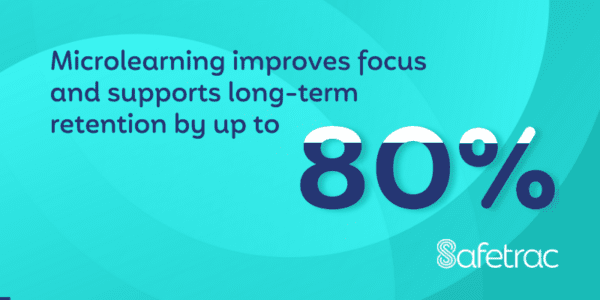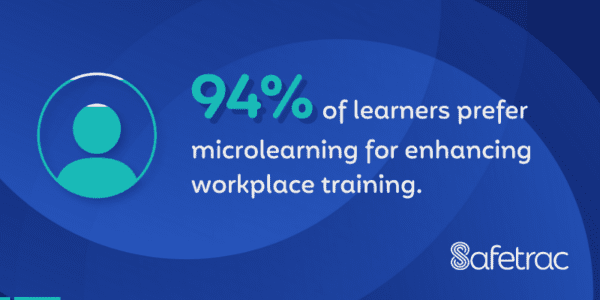Microlearning explained: Unlocking the power of short, targeted training
- Updated
- 5 min
In the world of corporate training, a revolutionary approach is taking center stage: microlearning.
These bite-sized chunks of knowledge are transforming how employees acquire new skills and stay compliant with regulations. But what exactly is microlearning, and why is it the future of continuous learning in the corporate sphere?
Discover this innovative concept, backed by the latest science in cognitive psychology and neuroscience, to understand its profound impact on corporate training.
What is Microlearning?
Microlearning is a strategic method of knowledge acquisition that delivers small, easily digestible pieces of information. These succinct modules, ranging from short videos to interactive quizzes, are designed to facilitate rapid absorption and retention, often in just a matter of minutes. By breaking down complex topics into manageable components, microlearning caters to the needs of today’s busy professionals, providing them with relevant, on-demand digital training that seamlessly integrates into their workflow.
The science behind MicroLearning
Microlearning is not just a trendy buzzword; it’s rooted in sound scientific principles from cognitive psychology and neuroscience.
Two key concepts underpinning microlearning are cognitive processes and the spacing effect.
Cognitive processes and chunking:
Cognitive processes govern how we learn, think, and solve problems. One crucial concept in this realm is “chunking,” which involves breaking down complex information into smaller, digestible parts.
By leveraging chunking, microlearning optimises learning outcomes, enabling individuals to process and retain information more effectively.
The science behind chunking is well-supported by research. Psychologist George Miller proposed that short-term memory can hold between five to nine pieces of information. By organising information into meaningful chunks, individuals can overcome the limitations of short-term memory and enhance their ability to learn and retain knowledge.

Memory retention and the spacing effect:
Another fundamental principle in the science of microlearning is the spacing effect. This concept highlights the importance of timing and continuous learning.
Rather than attempting to cram information all at once, the spacing effect suggests that revisiting information at intervals leads to better retention.
Microlearning aligns perfectly with the spacing effect by delivering bite-sized content regularly, reinforcing learning through spaced repetition. This approach not only enhances retention but also promotes long-term memory consolidation, ensuring that employees retain critical knowledge and skills over time.

Driving behavioural change through Microlearning
Behavioural change is a central goal of microlearning. By delivering short, focused content, microlearning aims to influence learner behaviour positively. Bite-sized modules can target specific behaviours or skills, promote regular practice, and provide immediate feedback, facilitating more effective learning and behavioural changes.
Meeting learners expectations with MicroLearning
Learners today expect training to be convenient, engaging, and relevant to their roles.
Microlearning aligns perfectly with these expectations:
- Convenience: Microlearning provides short, easily consumable modules that learners can access anytime, anywhere, catering to their busy lifestyles.
- Engagement: Multimedia elements and interactive features in microlearning enhance engagement and keep learners interested and motivated.
- Relevance: Custom compliance microlearning modules ensure training is directly applicable to learners’ job roles and responsibilities, increasing its relevance and effectiveness.
- Flexibility: Microlearning’s short duration allows learners to fit training into their schedules, empowering them to take control of their learning journey.
- Retention: Focused content and spaced repetition techniques in microlearning enhance retention and application of knowledge, ensuring that learning sticks.

Microlearning’s impact on compliance training
While Microlearning is often synonymous with soft skills development, its transformative potential in compliance training cannot be overlooked.
In the intricate landscape of compliance, where rules can be overwhelming, Microlearning excels in breaking down complex regulations into bite-sized modules, enhancing clarity for employees. Moreover, its adaptability ensures that just-in-time learning meets the challenge of ever-evolving compliance requirements.
By incorporating multimedia elements, Microlearning not only engages modern learners but also caters to the diverse expectations of different generations. This flexibility is crucial as compliance training needs to cater to a wide array of learners, each with distinct preferences and expectations.
Recognising the need for targeted training, Microlearning allows for easy customisation, ensuring that modules can be tailored to specific compliance needs.
In essence, Microlearning emerges as a strategic solution, not just for soft skills but as a dynamic tool for cultivating a compliant and knowledgeable workforce in the face of evolving learning expectations and regulatory landscapes.
Organisational benefits of MicroLearning
Microlearning offers significant advantages for organisations:
- Boosted employee engagement: Matches the shorter attention spans of today’s workforce.
- Tailored learning paths: Customisable content for different roles and skill levels.
- Cost-effective and scalable: A budget-friendly alternative for reaching a dispersed workforce.

Employee benefits of MicroLearning
For employees, Microlearning means:
- Convenience & flexibility: Learn at their own pace, even during breaks or commutes.
- Time efficiency: Quickly gain knowledge without lengthy sessions.
- Enhanced Retention: Bite-sized content boosts memory and application.
- Personalisation: Tailored to your preferences and job role.
- Skill development: Focuses on specific competencies, improving job performance.
- Continuous learning: Encourages ongoing skill acquisition.
Microlearning represents a paradigm shift in corporate training, offering a scientifically backed approach to learning that meets the needs of modern learners.
By leveraging cognitive psychology and neuroscience principles, microlearning maximises engagement, retention, and behavioural change, driving tangible results for organisations.
As the corporate landscape continues to evolve, microlearning stands poised to revolutionise the way we train and develop employees, ensuring that organisations remain agile, competitive, and compliant in the digital age.
Keen to learn more about Microlearning?
Learn more about our MicroLearns or contact us today to see how we can help you incorporate microlearning in your organisation’s compliance strategy.
Get the latest news
Stay updated with the latest news and expert insights on compliance, legislation, and industry trends.
